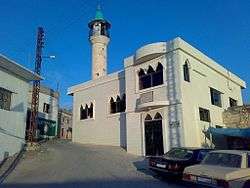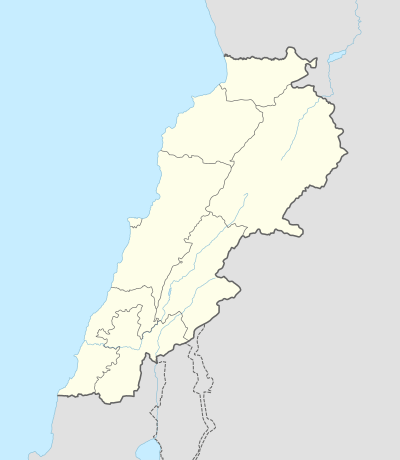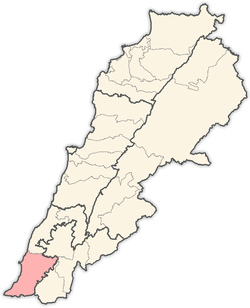Mahrouna
Mahrouna (Arabic: محرونة) is a small agribusiness town located in the south of Lebanon.[1]
Mahrouna محرونة | |
|---|---|
Town | |
 Mahrouna Mosque | |
 Mahrouna | |
| Coordinates: 33°13′8.25″N 35°20′33.92″E | |
| Grid position | 182/291 PAL |
| Country | Lebanon |
| Governorate | South Governorate |
| District | Tyre |
| Area | |
| • Total | 25 km2 (10 sq mi) |
| Elevation | 300 m (1,000 ft) |
| Population | |
| • Total | 4,000 |
| • Density | 160/km2 (410/sq mi) |
| Time zone | +2 |
| • Summer (DST) | +3 |
It is situated at a distance of 100 kilometres from Beirut, the capital, and 18 kilometres to the southeast of the city of Tyre. Mahrouna stands at a height of 400 meters above sea level. The population count is at approximately 3,800 inhabitants, however this number increases to about 5,000 during the vacations and summer times.[1]
According to a municipal member, this is the city of origin of the Lebanese poet and politician Tannus Alejandro Wehbe Malik who left for Colombia due to the occupation of the Ottoman Empire. He is also directly related to the Lebanese singer and actress Haifa Wehbe, also native to Mahrouna, and Jorge Wehbe, director at the Bank of the Province of Buenos Aires in 1955.
Name
E. H. Palmer wrote that the name Mahrûneh came from "'carded' (as cotton)."[2]
History
In 1875 Victor Guérin found it to be a Metawileh village,[3] he further noted: "Here are traces of a surrounding wall, ancient materials, a tomb cut in the rock, and a quarry, a part of which has been formed into a tank."[4]
In 1881, the PEF's Survey of Western Palestine (SWP) described it as: "A village, built of stone, containing about 150 Metawileh; no houses of note; situated on a hill, surrounded by olives, figs, and arable land, with a spring and cisterns."[5]
This peaceful quiet town is rich with its green surrounding, but it is especially famous for its oak and olive trees hill which forms a natural park for the town’s residents. This hill has an ancient ruin at the top with large squared stones arranged on top of each other to form part of a solid wall corner. The residents believe it to be the remains of a small castle or stronghold.
Unfortunately, this greenly oak hill has been bombarded several times since the 1970s by the Israeli jets. As a result, large numbers of oak trees were burnt in some parts of the hill, especially in 2006.[1]
The town is predominately inhabited by Shia Muslims, though the surrounding area also has a significant Christian minority. Inhabitants are mostly close or distant relatives. The prominent surnames in Mahrouna are Wehbe, Nehme, Awada, Makki, Shawraba, Salman, Abdullah and Kasem.[1]
Mahrouna became a municipality in 2004. During these municipal elections, nine municipal council members were elected for six years, with Kamal Wehbe elected president. Currently the municipality runs the services required for the town independently, although still remaining under the control of the central government.[1]
Haifa Wehbe, one of the most famous artists in the Arab world, was born in Mahrouna;[6] she also won Miss South Lebanon in 1992,[7] and was runner up for Miss Lebanon in 1996.[8]
Gallery
.jpg) Old Town House
Old Town House Town's Green View
Town's Green View Oak Tree Hill
Oak Tree Hill
References
- Makki, Hassan (7 July 2011). "Baldati eDialogue - Mahrouna". Archived from the original on 2011-07-07. Retrieved 23 December 2018.
- Palmer, 1881, p. 29
- Guérin, 1880, p. 408
- Guérin, 1880, p. 408; as cited in Conder and Kitchener, 1881, SWP I, p. 135
- Conder and Kitchener, 1881, SWP I, p. 93
- "ما لا تعرفه عن هيفاء وهبي .. من هي؟ سيرتها الذاتية، إنجازاتها وأقوالها، معلومات عن هيفاء وهبي". أراجيك (in Arabic). Retrieved 23 May 2019.
- "هيفاء وهبي تثير زوبعة في الخليج" (in Arabic). 1 May 2008. Retrieved 23 May 2019.
- "Haifa Wehbe". www.ticketingboxoffice.com. Retrieved 2018-12-23.
Bibliography
- Conder, C.R.; Kitchener, H.H. (1881). The Survey of Western Palestine: Memoirs of the Topography, Orography, Hydrography, and Archaeology. 1. London: Committee of the Palestine Exploration Fund.
- Guérin, V. (1880). Description Géographique Historique et Archéologique de la Palestine (in French). 3: Galilee, pt. 2. Paris: L'Imprimerie Nationale.
- Palmer, E.H. (1881). The Survey of Western Palestine: Arabic and English Name Lists Collected During the Survey by Lieutenants Conder and Kitchener, R. E. Transliterated and Explained by E.H. Palmer. Committee of the Palestine Exploration Fund.
Sources
- Municipality of Mahrouna
- Ministry of Interior and Municipalities, Republic of Lebanon
External links
| Wikimedia Commons has media related to Mahrouna. |
- Survey of Western Palestine, Map 2: IAA, Wikimedia Commons
- Mahrouna, Localiban
